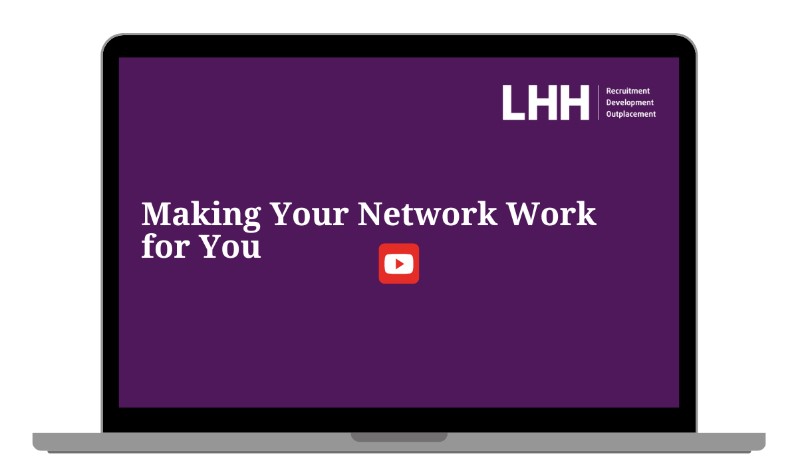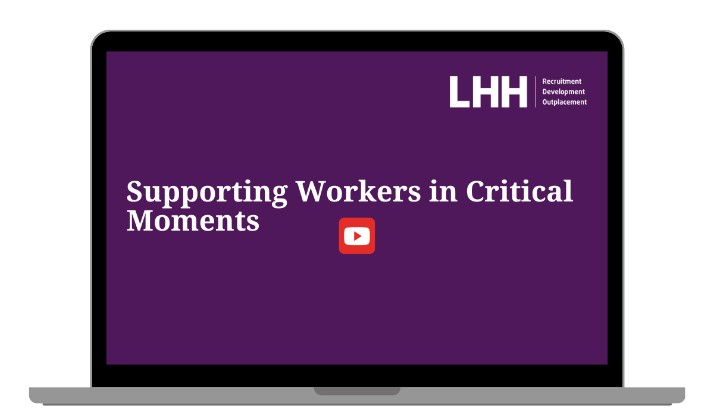HR as Catalyst for Employee Development
min
Employee development programs are essential to foster individual growth, but they also drive employee engagement, productivity, and retention for the organization.
In that spirit, LHH hosted a four-part webinar series exploring various aspects of career growth and empowerment. From understanding the concept of career activism to mastering the art of networking, building career confidence, and supporting workers through critical moments, these sessions offered insights for both individuals and organizations.
What is Career Activism?
This session equipped participants with strategies to proactively steer their professional growth, introducing a systematic framework for championing their own career trajectories.
Key Takeaways
- Career satisfaction is crucial for overall life satisfaction. The session cited research showing that 25% of life satisfaction comes from career satisfaction, highlighting how important one's career is to overall wellbeing.
- Setting and writing down career goals significantly increases the likelihood of achieving them. People who write down their goals are 30 times more likely to achieve them compared to those who don't have goals at all.
- Career development is not just about vertical progression. Development is a "rock climbing wall" or "lattice" career model, with lateral moves, enrichment in current roles, exploration, and even realignment as valid career development paths.
- Staying aware of industry trends and continuously developing skills is crucial. 65% of children in primary school today will end up in jobs that don't currently exist, making the importance of lifelong learning and adaptability critical.
- Taking ownership of one's career development is essential. Individuals need to proactively manage their careers, including scheduling development conversations with managers, creating action plans, and regularly reflecting on their career goals and satisfaction.

Making Your Network Work for You
This session focused on strategies for effective networking, overcoming common barriers to networking, and leveraging connections for career advancement.
- The importance of networking: 85% of all jobs are acquired through networking, highlighting how crucial it is for career development and opportunities. Additionally, 80% of professionals say networking is important to their career progression.
- Strategic approach to networking: Effective networking requires preparation and strategy. This includes having a clear objective, researching the person you're meeting, preparing targeted questions, and following up after the conversation. The SMART (Summarize, Market, Ask, Relate, Trade) approach was introduced as a framework for strategic networking.
- Overcoming networking barriers: Many people avoid networking due to feelings of imposing, lack of time, or discomfort. The discussion addressed these concerns by emphasizing the mutual benefits of networking and providing strategies to make it more comfortable and effective.
- Maintaining and nurturing networks: It's crucial to not just make connections but to maintain them over time. This includes following up after meetings, staying connected through social media, and finding ways to help your contacts. The goal should be to have 3-5 strategic networking conversations per week.
- Elevator pitch and networking tools: Have a well-prepared elevator pitch and other networking tools ready. This includes a personal branding statement, accomplishment stories (SOAR: Situation, Obstacle, Action, Result), and an up-to-date LinkedIn profile. These tools help to make networking conversations more effective and memorable.

Creating Career Confidence
This session focused on understanding and building self-confidence and self-worth in one's career, addressing negative assumptions, and providing strategies to enhance career confidence.
- Career confidence involves both self-confidence and self-worth. Low self-confidence can lead to missed opportunities, task avoidance, reduced engagement, and limited professional growth.
- The AIR technique (Awareness, Interruption, Reframe) is a powerful tool to challenge negative self-talk and assumptions, helping you shift to a more positive mindset.
- Focus on what you can control (your thoughts, actions, words, decisions) rather than what you can't control, as this builds confidence and reduces stress and self-doubt.
- The SOAR model (Situation, Obstacle, Action, Result) is crucial for documenting accomplishments and building confidence. Create short, impactful statements about your achievements, including quantifiable results when possible.
- Building self-confidence is a skill that requires consistent effort. Strategies include knowing your value, seeking feedback, challenging negative assumptions, and tracking progress. Managers play a critical role in building their team members' confidence through positive feedback and support.

Supporting Workers in Critical Moments
This session focused on emotional intelligence, psychological safety, and strategies for leaders to effectively support employees during important career conversations and decisions.
- Psychological safety is crucial for effective career development conversations. Employees need to feel safe to speak up, ask for feedback, and have productive conflicts. This safety leads to increased engagement, productivity, and reduced stress.
- Emotional intelligence plays a significant role in leadership effectiveness. Leaders with high emotional intelligence are more aware of their impact on others, can instill trust and cooperation, and are seen as more effective by their teams.
- Empathy Judo is a four-step process for managing emotionally charged conversations:
- Set the emotional tone
- Distract with questions
- Empathize with the employee's feelings
- Redirect to a positive outcome
- Leaders should focus on active listening, using powerful questions, fostering trust, and scheduling dedicated one-on-one career development conversations with employees. These actions help create an environment where employees feel supported in their career decisions and growth.
